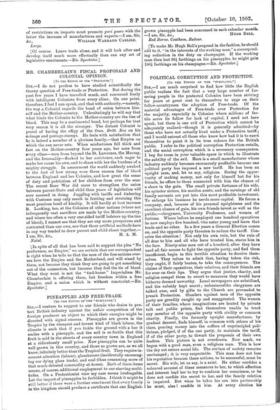PINEAPPLES AND FREE-TRADE.
[TO Tee EDITOR OF THE " SPECTATOR."]
venture to suggest to our friends who desire to pro. tect British industry against the unfair competition of the foreign producer an object to which their energies might be directed with signal success. Pineapples are grown in the Tropics by the cheapest and lowest kind of black labour, the climate is such that if you tickle the ground with a hoe it smiles with a pineapple, and the soil is so fertile that this fruit is sold in the streets of every country town in England at a ridiculously small' price. Now pineapples can be quite well grown in this country, and those so grown are, as we all know, infinitely better than the Tropical fruit. They require in- cessant attention (labour), glasshouses (incidentally encourag- ing our dying glass trade), and coal (thus consuming more of that much-debated commodity at home). Each of these items means, of course, additional employment to our starving multi- tudes. On a Protectionist view my case seems irrefragable. Let the import of pineapples be forbidden. I think it might be still better if there were a further enactment that every family in the kingdom should produce a certificate that one English- grown pineapple had been consumed in each calendar month.
—I am, Sir, &c., HUGH HELL. Bed Barns, Coatham, Bedcar.
[To make Mr. Hugh Bell's proposal in the fashion, he should add to it, "in the interests of the working man," a correspond- ing reduction in the duty on champagne. If the working man then lost 981 farthings on his pineapples, he might gain 1001 farthings on his champagne.—En. Spectator.]














































 Previous page
Previous page